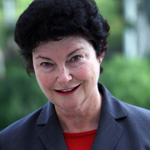Who washes, who dries?

Who washes, who dries?
- October 20, 2008
- Sociologist and CDASA director Judith Treas' research sheds light on how culture influences sharing of housework
 Attention all married women: Are you having trouble getting your husbands to chip
in around the house? According to UCI sociologist Judith Treas, if you live in the
United States, odds are you answered yes. If you lived in Sweden, however, you may
be singing a slightly different tune.
Attention all married women: Are you having trouble getting your husbands to chip
in around the house? According to UCI sociologist Judith Treas, if you live in the
United States, odds are you answered yes. If you lived in Sweden, however, you may
be singing a slightly different tune.
"We think that who does the dishes is an intimate matter based on our personal preferences
or on private negotiations with our partner," she says. "Actually, how couples split
the chores depends upon where they live."
With a newly awarded $300,000 grant from the National Science Foundation, Treas is
leading a comparative study of European countries and the U.S. to learn what makes
for greater gender equality in the division of labor.
In Sweden, for example, where gender equality is promoted more prominently than in
the U.S., Treas notes that men take on a larger share of the housework-more so than
American men do. "In Germany, however, the traditional 'homemaker' is still the ideal,
and so men leave more of the work to their wives," she says.
Using recent surveys carried out in dozens of Western countries, she aims to discover
what gender egalitarian societies have in common and how they differ from societies
where men avoid "women's work" around the house.
"In the U.S. more and more women are working for pay, yet housework, childcare, and
household management still fall mostly upon their shoulders," she says, adding that
this double shift at work and home has important consequences on marriages, decisions
to have children and pay at the workplace.
One of her more interesting findings thus far, she says, is the effect of labor migration
on shared household responsibilities. "All things considered, we've found that wives
are more likely to turn to husbands for help around the house in countries with higher
rates of residential mobility, such as the case in Australia," she says.
Further findings, while not guaranteed to get U.S. women more help around the house,
says Treas, may help explain declining fertility rates, rising divorce rates, and
similar trends that appear to be taking place around the world.
Working with her on this international study are leading researchers from Germany,
the Netherlands, and Hungary who will tackle other aspects of gender equality including
poverty, managerial employment, and organizational membership under the European Science
Foundation's European Collaborative Research (EUROCORES) Programme, which encourages
innovation by bringing together top researchers from different countries.
Their project runs from September 2008 through August 2011.
In addition to her role as sociology professor at UC Irvine, Treas also directs the
new UCI Center for Demographic and Social Analysis (C-DASA) and is current president
of the Pacific Sociological Association, the nation's largest regional association
for sociologists.
Share on:


connect with us: